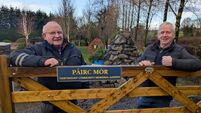To infinity and beyond – Roscommon connection to European rocket launch
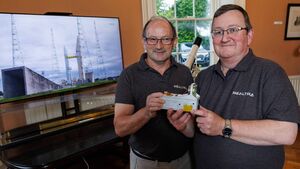
Danny Gleeson, right, Chief Commercial Officer, Réaltra and Michael Martin, Head of Engineering, Réaltra pictured at the launch event for the European rocket launch vehicle, the Ariane 6. Pic. Damien Eagers / Coalesce
It is a very exciting time for Danny Gleeson, Chief Commercial Officer of Réaltra Space Systems Engineering.
Recently the Kiltoom man and other members of the Irish space sector gathered at the Dunsink Observatory in Dublin to watch the maiden flight of the new European Space Agency (ESA) rocket, Ariane 6. The rocket was launched at Europe's Spaceport in French Guiana, South America. The Ariane 6 was designed and built by the ArianeGroup on behalf of the ESA Dublin based Réaltra, which appropriately means 'galaxy' in Irish, designed, built and delivered two state-of-the-art technology systems: the video telemetry system (VIKI), and the GNSS (Global Navigation Satellite System) telemetry system (GEKI).
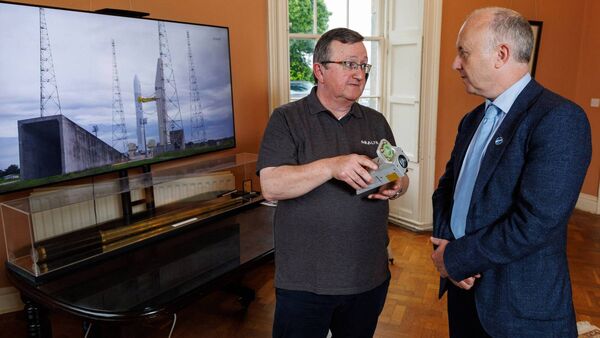
The VIKI will provide the live HD video telemetry images during all phases of the launcher mission, from six cameras located on-board the Ariane 6, while the navigation system will use advanced satellite navigation technology to ensure precise positioning, velocity, and timing measurements.
“It was a great event,” said Danny Gleeson, who is a physicist and has been working in the sector for 38 years. “We are delighted. The video images from our system were great and well received. They were broadcast globally, so people from Australia to Peru and back again have seen these images, which is amazing. It is an amazing achievement for a small Irish company which has a team of about twenty people. We certainly have Roscommon in our team. We have people from the county working with us.” He said that the company took terrestrial technology, built for use in aircraft or other vehicles, and repurposed it for use in space. This process of adapting existing technology for other uses is known as COTS (commercial off the shelf).
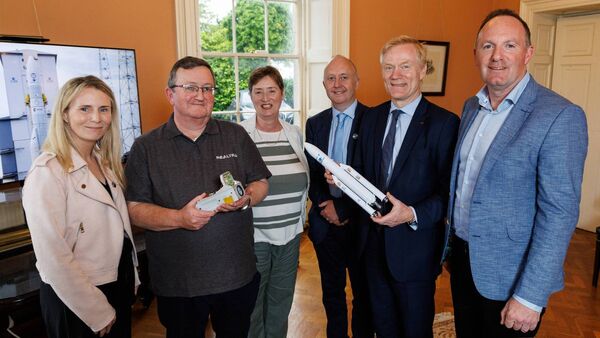
“We have the ability to change those electronics for use in space. It lowers the cost of putting things into space,” he said. “The cameras and all of the systems that we delivered to ArianeGroup were COTS. They were never intended for use in space but we modified them so they can be used. The idea of using what we have and adapting it is our talent. That’s our key driver as a business.” He added that the next project the company was working on was also very exciting.
“It is a science mission called Plato, an ESA mission which will launch in 2026. We have been working on that for a number of years and delivering equipment to that mission.” An exciting project, Plato will be looking for exoplanets, Earth like planets out in the galaxy orbiting other stars. Réaltra is providing a temperature controlling system for the craft’s cameras to ensure they are stable as they are observing the universe. The system is at the “highest end of space electronics” as they have to survive the unimaginable harshness of deep space.
“A small planet like Earth orbiting around a distant star is impossible to see, but you can see the dip in the light from the star,” said Danny. “That’s what these telescopes do and we maintain the temperatures of the telescope with our system. It’s an incredible project for us.” The company is also working on projects including the use of artificial intelligence in space.
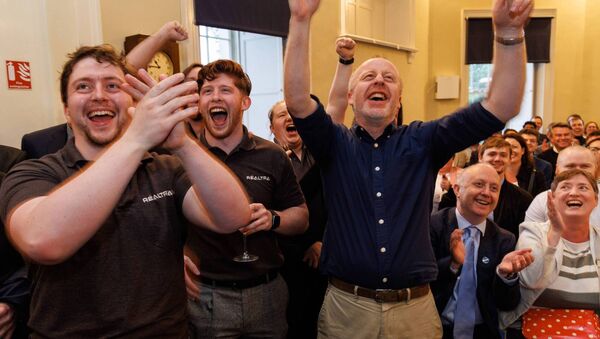
Réaltra also provided video telemetry on the launch of the James Webb Space Telescope on Christmas Day 2021. This telescope provided the beautiful and incredibly clear picture of other galaxies, which has now become an iconic image of the cosmos.
“It was a big success for us and ArianeGroup,” he told the Herald. “It is still operating now and will operate for another twenty years. It is an incredible new observatory that has been placed out in space. The telescope itself cost about $10 billion and was developed over 25 years.” Danny Gleeson has been living in South Roscommon for more than twenty years. He is married to Catherine Lenehan, who runs the Space Industry Skillnet.
“This is the national programme for raising the skills and talent within the space sector. That had a big input into the success of the space sector and the success of Réaltra,” he said. “The Space Industry Skillnet is based in the Midlands Innovation and Research Centre in TUS Athlone. People come from all over the world to give and receive training in Athlone.”
